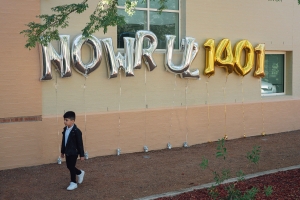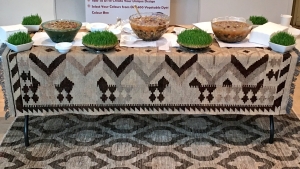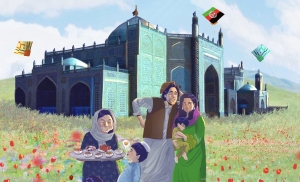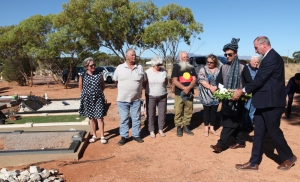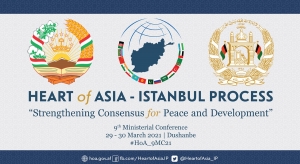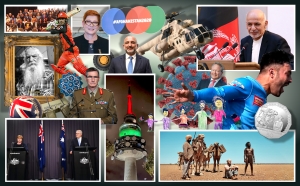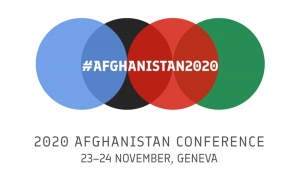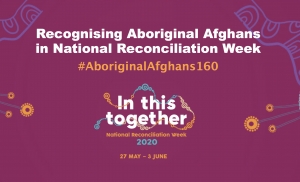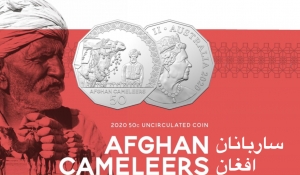Ambassador's Message on the International Day of Nowruz
New Year, New Century - Join us for Celebrating International Day of Nowruz 1401 at the Embassy
Nowruz, Dari/Farsi for ‘new day’, marks the spring equinox on March 21 each year, and is an ancient festival celebrating the Persian New Year. The International Day of Nowruz was officially recognised by the United Nations in 2010 and inaugurated into the Representative List of the Intangible Cultural Heritage of Humanity; celebrated across the world by many different countries and diaspora groups, and in the process bringing together different cultures and communities.
In Afghanistan it heralds the arrival of spring, the blooming of tulip flowers, and the greening of the plains and mountains that make up the Afghan landscape. In towns, cities and villages alike it is a time of great celebration and festivity, with families and people of different backgrounds coming together to welcome the first day of the year with colours, games and delicious foods.
Here in Canberra is no exception; and the Embassy of the Islamic Republic of Afghanistan wishes to extend its invitation to you to join us in welcoming the year 1401 with traditional festivities on Sunday the 20th of March at the Embassy grounds. Nowruz is an eagerly awaited date on the Embassy calendar, as we look forward to prosperous and peaceful new year for both Australia and Afghanistan, and our friends around the world.
Unfortunately, among other nonsense bans, Nowruz celebration is also totally banned under the Taliban extremists in Afghanistan who don’t believe in peace, don’t believe in harmony, don’t value cultural diversity, and don’t respect human dignity at all. The Taliban, IS-K and other terrorist groups are sticking in their totalitarian theocratic and harsh ideological belief based on misinterpretation of sharia law to promote clash of civilizations.
To make 1401 truly spectacular and given that we have entered a new century of solar calendar, the Embassy is proud to present New Year, New Century, International Day of Nowruz, featuring different activities, games, displays, exhibitions, performances, and more – there is something for everybody, and each family member can celebrate Nowruz in their own way.
There will be live music and live performances of traditional dance Attan by talented dancers and musicians travelling to Canberra from around Australia. Enjoy the performances while you admire the Embassy transformed by beautiful artworks and paintings by Dr. Yosuf Asefi, dazzling clothing displays and traditional carpets in rich colours. Sample some world-famous dry fruits and saffron tea or treat yourself to a lunch of delicacies as you have your name written in Afghan calligraphy.
Learn more about Nowruz as you view the Haft Sin table, representing seven important qualities for the new year, and taste the festive specialty, Meywa. Discover your Afghan horoscope. And if you’re more interested in understanding the past, take home a piece of Australia’s own history with an exciting and informative DVD documentary on Afghan Cameleers.
Try your luck and compete with your friends and family at popular traditional games such as kite flying, and ‘egg-fighting’ for a real taste of how Nowruz is celebrated in Afghanistan. For those amongst us who are more athletically inclined, play a spot of cricket and cheer on the Afghan team as it competes in the upcoming T20 2022 World Cup right here in Australia this October.
With all this and much more, the Embassy of Afghanistan is excited to announce its celebrations for Nowruz 1401. We look forward to welcoming community members, members of the diplomatic corps, members of Parliament and the public service, students, military personnel and all our other Australian and Afghan friends to welcome the New Year, New Century on Sunday the 20th of March.
Nowruz 1401 - Celebrating Ancestor's Heritage
The Embassy of the Islamic Republic of Afghanistan in Canberra, Australia will celebrate Nowruz 2022/1401 (solar calendar) with a series of cultural, artistic and entertainment programs at the premises of the Embassy on Sunday, March 20, 2022 from 10:00 am until 6:00 pm.
This historical event, which has deep roots in the history and culture of the people of Afghanistan, as well as most of its neighboring and regional countries, has been recognized by the United Nations since 2010 as the "International Day of Nowruz”. But unfortunately, by the Taliban takeover, Nowruz is now banned in Afghanistan.
The Afghanistan Embassy in conjuction with Afghan diaspora in Sydney and Melbourne will celebrate this historic and cultural day as an important annual festivity which is the heritage of our ancestors.
It is worth mentioning that Nowruz 2022 coincides with the start of the new century (Solar Calendar). Unfortunately, due to COVID restrictions, the Embassy was not able to celebrate this festivity in the last two years. We do hope that with collaboration and support of fellow Afghan communities and associations in Australia, this year’s Nowruz Festival will be celebrated with greater success.
From variety of Afghan cuisine, Samanak, Haft Meyva, saffron tea, Afghan products such as dry fruits, carpet exhibition, national costumes show, entertainment programs including musical performance and other Nowruz related activities are included in celebration of Nowruz 2022/1401.
Australian friends of Afghanistan and representatives of Foreign Diplomatic Corps will also participate in this historic festival. For this occasion, 20th of March this year will be an “Open Embassy Day” for all guests and visitors from different ages.
Afghan community/association/diaspora members are most welcome to contribute to Nowruz 2022 celebration. Let us take part in celebrating this national festivity and not let our indigenous traditions and historical days to be diminished and marginalized.
For more information and necessary coordination, please reach out via email: This email address is being protected from spambots. You need JavaScript enabled to view it. or mobile/ WhatsApp # 0416 465 572.
Joint Celebration of 160th Anniversary with the Afghan Cameleers’ Descendants
The Embassy of the Islamic Republic of Afghanistan in Australia celebrated the 160th Anniversary of the arrival of the Afghan Cameleers in Australia in South Australia, on March 11 and 12th, 2021. After its inauguration in June 2020, the 160th Anniversary events postponed for 2021 due to COVID-19 restrictions.
The Ambassador of Afghanistan, HE Wahidullah Waissi, hosted and chaired number of events in both cities. The events were attended by many Australian and Afghan community members who resided in South Australia, including descendants from the Afghan Cameleers, as well as representatives of local authorities in the city of Port Augusta where and when the disembarkation of the first group of Afghan cameleers had taken place on 12 March 1860.
In the sessions held in Adelaide and Port Augusta, the Afghan Cameleers descendants participated from different corners of Australia. Couples and individuals travelled from West Australia, Northern Territory, New South Wales and Victoria were among the participants. They met an Afghan Ambassador for the first time. In both events, the attended descendants were keen to hear about Afghanistan and their ancestor’s origin, history and culture of Afghanistan and its current affairs. They shared fond memories of their parents and grandparents from Afghanistan, their life after arrival in Australia and their legacies.
In a historic message, HE President of the Islamic Republic of Afghanistan, Mohammad Ashraf Ghani, reflected on the outstanding contribution of Afghan cameleers to Australian outback and people to people bonds between Australia and Afghanistan so that the legacy of Afghan cameleers to be kept alive across generations.
The ceremony also eventuated an academic session jointly chaired by Ambassador Waissi and Afghan Cameleers researcher and writer Dr. Pamela Rajkowsky. Academics, notably professors and experts of history, anthropology and art and many descendants of cameleers discussed the significant role of Afghan Cameleers to Australia’s intercontinental economic connectivity and cultural diversity as the first Moslems to Australia. The academic session also explored ideas and suggestions for future opportunities in people-to-people links between two friendly countries.
The Embassy of Afghanistan organised two wreath-laying ceremonies in Adelaide and Port Augusta in commemoration of the Afghan Cameleers by Ambassador of Afghanistan, Mayor of Port Augusta and representative of Afghan cameleers’ descendants.
In Adelaide, Ambassador Waissi also visited the “Adelaide Mosque” one the key icons that represent Afghan Cameleers’ contribution to the faith of Islam. It is also the oldest permanent mosque in Australia built in 1888. The tour of the mosque was organised by Sheik Helmi Bakhour, Imam of the mosque. Ambassador Waissi presented a praying matt as a gift of the Embassy to the Imam.
As part of his 3-day official visit, Ambassador Waissi met with high-ranking officials of South Australia, including Assistant Minister to the Premier Ms Jing Lee, the Leader of the Opposition at the Parliament of the South Australia, Mr Peter Malinauskas, and Lord Mayor of Adelaide, Ms Jayne Verschoor. All discussions focused on further strengthening bilateral ties between Australia and Afghanistan in various spheres.
For more information and background, click here.
To watch President Mohammad Ashraf Ghani's message to the Afghan Cameleers descendants, click here.
To watch interviews and history of the Afghan Cameleers, visit our YouTube Channel.
The Heart of Asia – Istanbul Process Declaration, 30 March 2021
The Heart of Asia – Istanbul Process
9th Ministerial Conference
“Strengthening Consensus for Peace and Development”
Dushanbe Declaration
Preamble
We, the Ministers of Foreign Affairs and high-level representatives of the Participating Countries, joined by the high level representatives of the Supporting Countries and of the Supporting Regional and International Organizations, having met in Dushanbe, Tajikistan on 30th March 2021 at the 9th Ministerial Conference of the Heart of Asia-Istanbul Process (HoA-IP), under co-chairmanship of H.E. Sirojiddin Muhriddin, Minister of Foreign Affairs of the Republic of Tajikistan and H.E. Mohammad Haneef Atmar, Minister of Foreign Affairs of the Islamic Republic of Afghanistan;
We express our gratitude to H.E. Emomali Rahmon, President of the Republic of Tajikistan and H.E. Mohammad Ashraf Ghani, President of the Islamic Republic of Afghanistan for inaugurating the 9th Ministerial Conference of the Heart of Asia-Istanbul Process;
Recalling the previous Ministerial Declarations of the HoA-IP and reaffirming our commitment to the principles, objectives, and outcomes enshrined in the Declarations for promoting peace, security, and prosperity in Afghanistan and the Heart of Asia Region;
Reaffirming that the HoA-IP is an important platform led by Afghanistan for enhancing dialogue and building trust among regional countries. The HoA-IP promotes regional political, security and economic cooperation with the goal of building peace, stability and prosperity in Afghanistan and the entire region;
Stressing the need to advance regional cooperation and dialogue as effective and necessary means to address common challenges and to promote security, stability and socio-economic development in the Heart of Asia Region, and renewing our commitment to strengthening enhanced cooperation through various combinations of bilateral, trilateral and multilateral processes among Participating and Supporting Countries in an effective manner;
Admiring the cooperation and solidarity of the countries and organizations participating in the HoA-IP, during the COVID-19 pandemic, and the assistance provided;
Peace, Political and Security Cooperation
- We support the ongoing efforts for the peace process and the continuation of the negotiations between the Government of the Islamic Republic of Afghanistan and the Taliban. While recognizing the importance and contributions of neighboring countries and regional and international partners, we call upon them to maximize their efforts for the success of the peace process;
- We acknowledge that long-term stability and prosperity in the region require peace and security in Afghanistan, and therefore the region as well as the international community has a shared responsibility and common interest to work together for promoting peace and stability in Afghanistan and the region as a whole;
- We welcome the renewed diplomatic efforts by all countries to accelerate the peace process through a meaningful peace negotiation, including the ongoing negotiations in Doha, the Moscow “Troika plus” meeting, and diligent preparations for a high-level meeting in Turkey. We also support the enhanced role for the UN in the peace process, and in this regard, welcome the recent appointment of the UN Secretary General’s personal envoy to Afghanistan and the surrounding region;
- We recognize that a comprehensive and permanent ceasefire will enable all sides to reach an agreement on a political settlement, and in this regard, we affirm that any political settlement must protect the rights of all Afghans, including women, youth and minorities. It should also respect the strong desire of Afghans to achieve durable peace and prosperity, and must respond to their strong desire to sustain and build on the economic, social, political and development gains achieved since 2001, including respect for Afghanistan’s international obligations;
- We condemn the continuing high level of violence in Afghanistan, especially the high number of civilian causalities and deliberate targeting of civil service employees, civil society activists, human rights defenders, journalists and media workers by the Taliban and terrorist groups. While condemning in the strongest terms, all terrorist activities in all forms and manifestations as being criminal and unjustifiable; we emphasize the need for an immediate, permanent and comprehensive ceasefire, resume meaningful peace negotiations and full respect for International Humanitarian Law;
- We also express our concerns about the continued relations between the Taliban and international terrorist groups, including Al-Qaida as outlined in the twenty-seventh report of the Analytical Support and Sanctions Monitoring Team of the United Nations Security Council (S/2021/68). While taking note of the recent announcement made by the Taliban to have ordered its members across Afghanistan not to allow foreign fighters in their ranks, we reaffirm the importance of ensuring that the territory of Afghanistan is not used as safe havens for any terrorist groups, foreign terrorist entity, including Daesh/ISIS, Al-Qaida or other regional and international terrorist groups and their affiliates, including those referenced in the previous HoA Declarations;
- We commend the sacrifices and achievements of the Afghan National Defense and Security Forces (ANDSF) and in the fight against international terrorism, and we emphasize the importance of supporting the Afghan Government in capacity building, in particular of the ANDSF, in securing their country and in the fight against international terrorism;
- We remain determined to counter all forms and manifestations of terrorism and extremism by reinforcing our collective efforts. We reiterate our resolve to work together to prevent and suppress terrorist acts through increased regional and international solidarity and cooperation, in accordance with the UN Charter and obligations under international law, including international human rights law, international humanitarian law, and where applicable the international refugee law, as well as through the full implementation of the UN Security Council Resolutions. In this regard, we strongly call for concerted regional and international cooperation to ensure dismantling of terrorist sanctuaries and safe havens, preventing and interdicting the movement of terrorists and terrorist groups, including foreign terrorist fighters, across the countries of the HoA Region and anywhere else, as well as disrupting all financial, tactical, logistical or any other form of support for terrorism without any distinction;
Counter Narcotics
- We are concerned about the high level of illicit cultivation and production of opium in Afghanistan, the volume of drug trafficking, illicit drug trade, trafficking of precursors, the new prevalence of methamphetamine, the rising demand for illicit narcotics and the rising drug abuse in the HoA Region and beyond. This poses a threat to the socio-economic development, security and stability not only in Afghanistan, but also in the surrounding region and the world as a whole. Further eradication of opium cultivation, promotion of alternative livelihoods, law enforcement, prevention, treatment, rehabilitation and public information efforts are required as part of a comprehensive and integrated strategy to address this common challenge, based on the principle of common and shared responsibility, and consistent with the international drug control Conventions;
- We call upon the international community to continue to assist the Government of Afghanistan in implementing its National Drug Control Strategy and National Drug Action Plan and its efforts to eliminate the cultivation and production of, trafficking in and consumption of illicit drugs, increase support for Afghan law enforcement and criminal justice agencies, agricultural and rural development for the creation of improved alternative, licit livelihoods for farmers and demand-reduction support, increase public awareness of counter-narcotics issues and build the capacity of drug control institutions, and care and treatment centers for drug users. We also stress the urgent need to respond to the serious challenges posed by the nexus between revenue from illicit narcotics and financial support for anti-government actors and terrorist entities in Afghanistan and the HoA Region. We appreciate efforts to strengthen capacity of law enforcement, border control and other relevant agencies to counter illicit drug production and trafficking in the HoA Region, including through training projects and activities under the auspices of the United Nations Office on Drugs and Crime;
Refugees and Returnees
- We commend countries in the region and beyond for their hospitality and support in hosting millions of Afghan refugees for four decades. We acknowledge the role of regional and neighboring countries in particular Iran and Pakistan in hosting Afghan refugees for such a long time and call for creating conducive conditions in Afghanistan for voluntary, safe, dignified and sustainable repatriation. In respecting the well-being and human rights of the refugees, we urge the international community to continue to assist host countries in taking care of the essential needs of Afghan refugees and to provide support to the repatriation and reintegration efforts of the Government of Afghanistan and targeted assistance for their voluntary, safe and dignified repatriation and their sustainable reintegration in Afghanistan, with emphasis on youth, education and livelihoods;
Economic Cooperation
- We welcome the Afghanistan National Peace and Development Framework II, aligned with the Afghanistan Partnership Framework as part of the new aid architecture adopted at the 2020 Afghanistan Conference in Geneva, setting out the strategic policy priorities of the Government of Afghanistan and guiding its reform activities within the three pillars of Peace-building, State-building and Market-building, in the pursuit of increased self-reliance by the end of the Transformation Decade in 2024;
- We appreciate the long-term partnership and commitment of the international community for supporting the Government and people of Afghanistan and stress the crucial need for continuation of such support for achieving a peaceful, stable and prosperous Afghanistan based on their renewed mutual commitments, as agreed upon at the 2020 Conference on Afghanistan;
- We reaffirm that regional economic cooperation and integration offers broad opportunities for socio-economic development, and can assist with exploiting and developing the long-term economic potential that exists in Afghanistan and the wider region, and we stress the need for further advancing regional economic cooperation as an effective means to achieve lasting peace, stability and economic prosperity in Afghanistan and the HoA Region;
- We welcome the joint efforts of Afghanistan and the region to enhance dialogue and collaboration in advancing economic development in Afghanistan and across the HoA Region, including measures to facilitate regional connectivity, trade and transit, expand consular visa cooperation, and facilitate business travel, expansion of trade, increase the foreign investments and development of infrastructure, including infrastructural connectivity, energy supply, transport and integrated border management, with a view to promoting sustainable economic growth and the creation of jobs in Afghanistan and the region;
- We acknowledge the historical role of Afghanistan as a land bridge in promoting regional connectivity and economic integration in the HoA Region, and we recall that such regional economic cooperation plays an important role in achieving stability and development in Afghanistan, in this regard we urge all relevant stakeholders to create a feasible and secure environment for the full implementation of these development initiatives and trade agreements. We also welcome the progress made by these initiatives and projects, and call upon all regional countries to facilitate trade and transit;
- We recognize the important role of Regional Economic Cooperation Conference on Afghanistan (RECCA) as a regional platform for promoting economic cooperation in Afghanistan and the region, and in this regard, we support the implementation of the priority regional projects as outlined under the Declaration of RECCA-VII. We look forward to the next RECCA Ministerial Meeting to be held in the second half of 2021 in Tashkent, the Republic of Uzbekistan;
- We also recognize the important role of the SCO-Afghanistan Contact Group, ECO, CICA, CAREC and SAARC as platforms for cooperation between Afghanistan and the region;
Regional and International Organizations
- We recognize the important role of regional organizations supporting different areas of cooperation under the HoA-IP and underline the need to strengthen the relations of HoA-IP with other regional organizations;
- We recognize the central and impartial role of the United Nations in promoting peace and stability in Afghanistan and express our appreciation for all efforts of the Secretary-General and his Special Representative for Afghanistan through the United Nations Assistance Mission in Afghanistan (UNAMA);
- We appreciate the continued efforts by the OIC and its Member States in support of the Afghan Peace Process and their call for an immediate and comprehensive ceasefire. We also welcome the declarations of the Muslim countries calling for an end of violence and calling the ongoing war and bloodshed in Afghanistan religiously illegitimate;
Confidence Building Measures
- We realize the importance of the Confidence Building Measures (CBMs) as the key element for enhancing trust and practical political, security and economic cooperation in the HoA Region, and in this regard, we urge the Participating Countries to continue the implementation of the CBMs;
- We commend the Government of Pakistan for holding the first Regional Technical Group (RTG) Meeting of the Agriculture Development CBM, and call upon the lead countries of the 8 CBMs to convene the RTG Meetings in a timely manner as decided previously;
- We appreciate the valuable support of the international community to the HoA-IP. In this context, we look forward to continued contributions of the Supporting Countries and Organizations to realize the implementation of activities prioritized under each CBM;
- We endorse the Implementation Plan for the new Women Empowerment CBM and the amended Implementation Plan for Disaster Management and Environmental Protection CBM, and appreciate the work done by the co-chairs in regards;
- We welcome the World Bank as a new Supporting Organizations of the Process;
Conclusion
- We task our Senior Officials to hold the next Senior Officials Meeting (SOM) of this Process, within three months of this Conference, to implement and follow up on the decisions made in this conference;
- We express our sincere appreciation to the Government of the Republic of Tajikistan for hosting the Ninth Ministerial Conference of the HoA-IP in Dushanbe. We welcome Afghanistan for hosting the Tenth Ministerial Conference in 2022;
- This Declaration was adopted in Dushanbe on 30 March 2021 by the Foreign Ministers and high-level representatives of the Participating Countries of the HoA-IP: Islamic Republic of Afghanistan, Republic of Azerbaijan, People's Republic of China, Republic of India, Islamic Republic of Iran, Republic of Kazakhstan, Kyrgyz Republic, Islamic Republic of Pakistan, Russian Federation, Kingdom of Saudi Arabia, Republic of Tajikistan, Republic of Turkey, Turkmenistan, the United Arab Emirates, and Republic of Uzbekistan;
- This Declaration was welcomed by the high-level representatives of the Supporting Countries and Supporting Regional and International Organizations of the HoA-IP: Commonwealth of Australia, Canada, Kingdom of Denmark, Arab Republic of Egypt, Republic of Finland, Republic of France, Federal Republic of Germany, Republic of Iraq, Republic of Italy, Japan, Republic of Poland, Kingdom of Norway, Kingdom of Spain, Kingdome of Sweden, the United Kingdom, the United States of America, Aga Khan Development Network (AKDN), Asian Development Bank (ADB), Conference on Interaction and Confidence Building Measures in Asia (CICA), Economic Cooperation Organization (ECO), European Union (EU), North Atlantic Treaty Organization (NATO), Organization of Islamic Cooperation (OIC), Organization for Security and Cooperation in Europe (OSCE), Shanghai Cooperation Organization (SCO), South Asian Association for Regional Cooperation (SAARC) and the United Nations (UN).
*END*
2020 The Year in Review: Highlights of Relations between Afghanistan, Australia & the Pacific
Highlights of Relations between Afghanistan, Australia & the Pacific in 2020
2020 has been a tumultuous, challenging, yet a rewarding year for all. The Embassy of the Islamic Republic of Afghanistan, despite the limitations imposed by COVID-19, has been hard at work in supporting Afghans in Australia, New Zealand and Fiji, growing partnerships and friendships and advancing the causes of peace and mutual prosperity.
The Afghan-Australian relations have deepened considerably in 2020 over various areas of cooperation and shared history. Various events and visits were held, both in-person and virtually to commemorate several occasions, most notably the 160thanniversary of the arrival of the famous Afghan cameleers in Australia. Cultural, people-to-people, political, trade and security ties have all had the opportunity to grow. We invite you to reflect on this year in Afghan-Australian relations and on what the future holds for the two countries and their friendship.
Political Ties:
The steadfast political friendship between Afghanistan and Australia has only grown stronger in 2020. Organised by the Embassy, The Australia-Afghanistan Parliamentary Friendship Group met, alongside Ambassador Wahidullah Waissi and other diplomats, at the Hyatt Hotel in Canberra on the 25th of August. Inaugurated in 2017, the group is chaired by Andrew Wallace MP. The reception this year touched upon the topics of the Afghan peace process, the impacts of COVID-19 on Afghan society and its economy, the future of Australian assistance and engagement with Afghanistan and people to people bonds. Ambassador Waissi on the 29th of August also made a visit to the DFAT Diplomatic Academy, discussing diplomatic studies and areas where Afghan-Australian collaboration can be enhanced with its Executive Director Paula Ganly.
Across the Tasman, the Embassy was also hard at work in promoting an expanding relationship with New Zealand. During Ambassador Waissi’s visit to Wellington, he inaugurated a similar group, the Australia-Afghanistan Parliamentary Friendship Group, including Members of Parliament from most major parties. This Friendship Group will, in the years to come, help in developing the bilateral relationship between Afghanistan and New Zealand, especially in trade and support of the nearly 15,000 Afghans living in New Zealand
High-level talks also occurred in 2020, with Afghanistan’s Foreign Minister, Mohammed Haneef Atmar in discussion with Australian Foreign Minister, Marise Payne. The two Ministers discussed the ongoing Afghan peace process, and the much-appreciated Australian aid to Afghanistan, helping its economic and social development.
2020, of course, was marked by a new start to the Afghan peace process, with negotiations beginning in Qatar between the government and the Taliban. Australia has been vocal in its strong support for peace in Afghanistan, urging for an immediate humanitarian ceasefire to be implemented.
Following the horrendous attack on Kabul University on the 2nd of November, the Australian government, academia and public were also quick to condemn the perpetrators and to voice their strong support for the Afghan people and the attack’s victims. Diplomats, professors and all areas of Australian society wrote their much-appreciated condolences to the Embassy.
Cultural Relations:
2020 was another significant milestone in the shared cultural history of Afghanistan and Australia. While 2019 saw the 50th anniversary of Afghan-Australian diplomatic relations, 2020 brought about the 160th anniversary of the arrival of the first Afghan cameleers in Australia. The Afghan cameleers were instrumental in exploring, charting and settling the arid interior of Australia, allowing trade routes to flourish and communities to grow in the outback. Their seldom mentioned stories were brought to light by the celebrations and commemorations organised by the Embassy.
On the Embassy’s social media and website, exclusive interviews were aired featuring historians, academics, and the descendants of Afghan cameleers, who often married European and Aboriginal women. Afghans’ impacts on the spread of Islam in Australia was also revealed, with an article published on the Embassy website, written by historian and Afghan cameleer expert Pamela Rajkowski OAM.
The Australian government also celebrated this anniversary. The Royal Mint announced the production of special commemorative 50 cent coins, depicting an Afghan cameleer and his mount. Furthermore, the Minister for Indigenous Australians, Ken Wyatt MP, also a descendant of cameleers, met with Ambassador Waissi to discuss their history and the impact they had on the outback and indigenous communities.
The President of Afghanistan, Ashraf Ghani, also made a statement on the importance of the cameleers on the friendship between Afghanistan and Australia. In his words: “We began our relationship with Australia with our cameleers who crossed the desert, now the proud Australians are here to cross our mountains and rivers with us and create history together”.
2020 was also the 101st Anniversary of Afghan independence. Despite the stringent restrictions in place, the Embassy was still able to organise commemorations of this event. The iconic Telstra tower in Canberra, was lit up in the national colours of Afghanistan: black, red and green. Ambassador Waissi also gave an official recorded message to the public and members of the Afghan Australian community. Furthermore, even with the second wave forcing Victorians back into lockdown, the Afghan flag was raised in the City of Dandenong, in Greater Melbourne, impressive achievements given the difficult circumstances.
Earlier in the year, before the outbreak of the pandemic, the Embassy participated in the National Multicultural Festival in Canberra, with its official stall “A Journey to Afghanistan”. This gave a chance to display Afghan culture and heritage to Australia, through a live performance of traditional music, displays of art and jewellery, calligraphy and samples of food and drink. The Embassy’s contribution was very received by the community attracting many visitors throughout the course Festival.
Additionally, Ambassador Waissi paid a visit to the Director of the Australian War Memorial, Matthew Anderson, to submit traditional Afghan clothing and handicrafts to the national collection, and to discuss the future expansion of the War Memorial’s Afghanistan exhibition and joint activities in the spirit of Afghan-Australian friendship.
The Embassy also organised recollections and celebrations of the first anniversary of the performance of the Zohra Orchestra, Afghanistan’s first all-female musical ensemble, at the Sydney Opera House. Members of the Afghan Australian community, politicians and prominent Australians all voiced their fond memories of the event through many statements, and the entire concert was posted on Embassy social media.
Trade and Investment:
The Australian company Fortescue Metals Group, the world’s fourth largest iron ore producer, signed 5 memoranda of understanding in Kabul with the Ministries of Public Health, Higher Education, Mines and Petroleum, the Afghanistan National Water Affairs Regulation Authority, and the Afghan Red Crescent Society. Fortescue’s Chairman, Dr Andrew Forrest, remarked that “we hope wherever and whenever we can, Fortescue and Minderoo will help you lead a country where we dramatically increase the survival for cancer, increase the wisdom of your academic research leaders and ensure equality of women”. The signing ceremony was undertaken in the presence of President Ashraf Ghani and First Vice-President Amrullah Saleh. The previously untapped natural resources of Afghanistan, with the help of Australian companies such as Fortescue, are bound to create many opportunities for Afghans to prosper and for the country to develop further.
Also, this year, Ambassador Waissi engaged in a teleconference call with the Deputy CEO of Austrade, Sally-Ann Watts to discuss potential areas of trade and business cooperation between Australia and Afghanistan.
Security:
Afghan National Army cadets continue to train at Australia’s defence academies. In April, two Afghan cadets, Bazmohammad Watandost and Siavash Saduqi graduated from the prestigious Royal Military College Duntroon after an 18-month training programme. 2021 is set to bring two more Afghan cadets to train in Australia, including the first female Afghan cadet to do so.
Engagement continued at the higher levels of government as well, with Afghan National Security Advisor Dr Hamdullah Mohib and Acting Defence Minister Asadullah Khaled meeting with Australian Defence Minister Linda Reynolds during the February Munich Security Conference. They discussed Australia’s ongoing military support to Afghanistan in its fight against terrorism and the importance of the Afghan Peace Process.
The Embassy of Afghanistan has also been committed to ensuring compliance with the rule of law in security-related matters. With the Australian investigation into alleged war crimes committed by its special forces in Afghanistan, the Embassy has been vocal in its urging for a thorough investigation and prosecution of war criminals. This was accompanied by the release of a similar inquiry in New Zealand, into the NZSAS’ Operation Burnham, which led to the death of several civilians in Bamiyan Province in 2010. However, the official inquiry held that the operation was justified.
Sports:
The sporting friendship between Afghanistan and Australia continues to grow, especially in the field of cricket. Afghan cricketers continue to excel in Australia’s Big Bash League, with Rashid Khan, Mohammad Nabi, Zahir Khan and Mujeeb Zadran performing exceptionally for their teams in Australia. Furthermore, in October, the Melbourne Renegades signed 15-year-old Afghan Noor Ahmad for the coming Big Bash season, an exceptional accomplishment for the next generation of Afghan sportsmen.
2020 also brought very sad news, with the passing of Australian cricketing legend Dean Jones. Jones was a true friend of Afghanistan, visiting Kabul in 2017 to commentate and act as the interim coach of Afghanistan’s national cricket team. His legacy of promoting friendship and peace through sport will be sorely missed by all.
Development and Humanitarian Assistance:
The quadrennial Afghanistan Conference was held on the 23rd and 24th of November 2020, hosted remotely in Geneva by the UN, the Afghan and the Finnish governments. It discussed sustainable peace building, such as human and women’s rights and reintegrating returning refugees, methods for fighting corruption and economic and foreign aid matters. Australia was one of the 70 participants from around the world that contribute to this year’s Conference.
Australia has also been generous in responding to the extent and impact of the COVID-19 pandemic in Afghanistan. In the latest Australian budget, over $11.5 million was allocated in additional funding for humanitarian assistance provided by Australia to Afghanistan. Australia’s Department of Foreign Affairs and Trade in October released a two-year plan on aiding the development of Afghanistan. Australia will, with renewed focus, support Afghanistan’s health security, security and economic recovery, focalising on the participation and empowerment of women.
Education:
Relations between Afghan and Australia in higher education have also grown substantially in 2020. In October, a collaboration agreement between Kabul Polytechnic University, Australia’s Griffith University and the Brisbane-based International Water Centre was signed in a virtual ceremony attended by Ambassador Waissi. This has inaugurated a new course at Kabul Polytechnic University, the Master Programme on Integrated Water Resource Management, convened jointly with its Australian partners and funded by the Asian Development Bank.
Furthermore, a round of virtual debates was hosted between the Monash International Affairs Society and Afghans for Progressive Thinking to debate several topics about gender equality and peace in Afghanistan. This exceptional opportunity for increased people-to-people and academic links was welcomed by all, especially considering the disruptive COVID pandemic and the ongoing peace talks in Qatar. The fifth round of debate, which took place in September, was adjudicated by Ambassador Waissi.
Consular Support:
Throughout 2020, The Embassy’s staff has been hard at work providing consular support to Afghan citizens in Australia, New Zealand and Fiji. This was much-needed, especially during the lockdowns that struck cities across these countries due to the COVID-19 pandemic. The ordeal was exacerbated by the second wave in Victoria, where one of Australia’s largest Afghan communities resides. Hence, while in-person consular services were impossible, the Embassy undertook innovative virtual consular services to Afghans, as well as frequently liaising with community leaders across the country.
Conclusion:
The start of the new decade has brought about challenges and opportunities for Afghanistan, Australia and their bilateral relationship. New engagement opportunities in trade, security, culture, education and politics will deepen our friendship for the years to come. Through our two countries’ shared history of the cameleers, Afghanistan and Australia are expanding their understanding of each other's culture and people. 2021 is bound to be another fruitful year for our friendship, with more in-person events and people-to-people exchanges possible. The Embassy would like to thank all who have supported it and Afghanistan throughout this difficult yet productive year and those who make the bright future of Afghan-Australian relations, focussed on our shared values, possible.
2020 Afghanistan Conference Communiqué
The 2020 Afghanistan Conference was a ministerial pledging conference, co-hosted by the Governments of Afghanistan and Finland with the United Nations, took place from 23–24 November. The quadrennial pledging conference was an important opportunity for Afghanistan and the international community to commit to common objectives for promoting sustainable development, prosperity and peace in the country.
A central aim of the conference was to determine shared development objectives and commitments for the period 2021–24 for the Afghan government and the international community.
The shared development objectives will guide development cooperation and provide financial support for Afghanistan. In addition to the pledges of financial support, a new development framework, a joint political declaration and a new aid architecture supporting Afghanistan’s development needs and priorities are the outcomes of the conference.
-----
2020 Afghanistan Conference Communiqué
The 2020 Afghanistan Conference took place at the Palais des Nations in Geneva with participants from 66 countries and 32 international organisations. The Conference was held in a virtual format and it was cohosted by the Government of Islamic Republic of Afghanistan, the Government of Finland and the United Nations. The event took place under extraordinary circumstances, at the beginning of the final four-year cycle of the Transformation Decade, shortly after the start of the Afghanistan Peace Negotiations and during the COVID-19 pandemic. At the Conference, the participants renewed their long-term commitment to support Afghanistan in seizing this historic opportunity on its path towards peace, prosperity and self-reliance and to continue efforts for the benefit of all Afghans. The participants committed to reconvene to review progress and pledges at a Senior Officials Meeting in 2021 and in a Ministerial Meeting in 2022.
1. We, the Government of Islamic Republic of Afghanistan (hereafter called the Afghan Government) and the international community along with other partners underline our commitment to establish a renewed partnership to strengthen a sovereign, unified, democratic and peaceful Afghanistan that is on a path towards prosperity and self-reliance for the benefit of all Afghans. Under this partnership, we welcome the Afghanistan National Peace and Development Framework II and the Afghanistan Partnership Framework and undertake to be mutually accountable in supporting the efforts of the Afghan people to achieve tangible results in the field of peace-building, state-building and market-building.
2. We acknowledge the widespread and sincere demand of the Afghan people for lasting peace and an end to the war, and recognize that a sustainable peace can be achieved only through an Afghan-led, Afghan-owned peace process that is internationally supported. We call for earnest efforts by all to realize lasting peace and stability in Afghanistan.
3. In keeping with the United Nations Security Council Resolution 2513, we welcome the start of the Afghanistan Peace Negotiations on September 12, 2020, aiming for an inclusive political settlement and a permanent and comprehensive peace. We further welcome the efforts of all regional and international partners of Afghanistan in this regard and recognize the efforts of the Government of Afghanistan and of all other Afghan actors, including the two negotiating teams in facilitating the Afghanistan Peace Negotiations. We acknowledge that significant progress in the peace negotiations in the spirit of the United Nations Security Council resolution 2513 is a key factor for the delisting within the United Nations Security Council Committee established pursuant to resolution 1988(2011).
4. We call for an inclusive and meaningful peace process with the participation of women, youth and ethnic, religious and other minorities. We affirm that any political settlement must protect the rights of all Afghans, including women, youth and minorities. It should respect the strong desire of Afghans to achieve durable peace and prosperity, and must respond to the strong desire of Afghans to sustain and build on the economic, social, political and development gains achieved since 2001, including adherence to the rule of law, respect for Afghanistan’s international obligations, and improving inclusive and accountable governance.
5. We underscore the importance of the Afghan Government’s efforts, which the international community is committed to support, to fulfil its commitment to a unified, sovereign, peaceful and democratic Afghanistan. We emphasize the need for a meaningful role for civil society, including the independent media, in this process. While respecting the sovereign right of the Afghan people to decide on the nature of the future political settlement, we underscore that the outcome, as outlined in paragraph four, above, will shape the future of international support and assistance.
6. We highlight that international development assistance and South-South cooperation bear great importance to Afghanistan’s economic and social development. We call on the international community to continue their financial support to Afghanistan, with the aim of helping Afghan people to achieve peace, reconstruction and development at an early date.
7. We acknowledge that security and stability are vital to sustainable development. We express deep concern about the continuing high level of violence and the security situation in Afghanistan, especially the number of civilian casualties and call for an immediate permanent and comprehensive ceasefire, and full respect of International Humanitarian Law.
8. We further express deep concern about the threat posed by terrorism to Afghanistan and the region, express serious concern over the continuing presence of ISIL, Al-Qaida as well as other international terrorist organizations and their affiliated groups in Afghanistan. We condemn in the strongest terms all terrorist activity and all terrorist attacks and reaffirm the importance of ensuring that the territory of Afghanistan should not be used by ISIL, Al-Qaida or other international terrorist groups to threaten or attack any other country, and that neither the Taliban nor any other Afghan entity, group or individual should support terrorists operating on the territory of any country.
9. We emphasize the importance of supporting the Afghan Government in capacity building, in particular of the Afghan National Defence and Security Forces (ANDSF) including the Afghan National Police (ANP) in securing their country and in their fight against terrorism.
10. We stress the important role and long-term commitment of the United Nations in promoting peace and stability in Afghanistan and welcome UNAMA’s ongoing efforts in the implementation of mandated tasks.
11. In the spirit of mutual accountability, we underscore the importance of the Afghan Government’s actions and the commitment from the international community to support the efforts of the Government in fulfilling its commitments to improve governance and the rule of law, including transitional justice as an essential component of the ongoing peace process, budget execution and the fight against corruption throughout the country.
12. We highlight the importance of regional cooperation, with a view to promoting stability and peace, as well as assisting Afghanistan in utilizing its unique geopolitical and geographical position as a land bridge to promote regional cooperation and connectivity, based on transparency, openness and inclusiveness with the aim of enhancing dialogue and collaboration to advance shared goals of economic development across the region.
13. We express concern over the cultivation, production, trade and trafficking of illicit drugs in Afghanistan which continue to pose a threat to peace and stability in the region and beyond, and call upon the Afghan Government and the international community to strengthen efforts to counter this threat through international, regional and sub-regional cooperation.
14. We acknowledge the economic development achieved by Afghanistan with the support of the international community in the past years, notably through the Afghanistan Reconstruction Trust Fund (ARTF) and recall the critical role the private sector, revenue generation and a conducive business climate, that includes the participation of women, will continue to play in this regard. We highlight the need for renewed vigour in implementing economic reforms and undertake to renew our long-term support and assistance to the Afghan people in achieving the Sustainable Development Goals.
15. We call for all relevant parties to work closely to facilitate the voluntary, safe, dignified and sustainable return, rehabilitation and reintegration of the Afghan refugees and express appreciation to those regional countries, in particular Pakistan and the Islamic Republic of Iran, that continue to host them.
16. We further call for continued cooperation between the Afghan Government, international partners, and neighbouring countries to stem irregular migration through enhanced collaborative efforts to fight migrants smuggling and human trafficking networks.
17. We note that humanitarian aid will continue to be needed for the foreseeable future and access of humanitarian actors must be ensured throughout the country in full abidance to humanitarian principles.
18. We recognize the profound challenges posed by the COVID-19 pandemic and climate change, and their impact on Afghanistan and the well-being of its citizens, notably women, and express continued readiness to support the Afghan people towards a socially, economically and ecologically sustainable recovery.
19. We look forward to a Senior Officials Meeting in 2021 and a biennial ministerial meeting in 2022 to review progress as Afghanistan is approaching the end of its Transformation Decade.
24 November 2020, Palais des Nations, Geneva
Celebrating 160th Anniversary of the Arrival of Afghan Cameleers in Australia
Australia and Afghanistan share a friendly and long-standing relationship. Relations can be traced back as far as the 1860s when Afghan cameleers came to Australia. In fact, 2020 marks the 160th anniversary of the arrival of these cameleers. The history and contribution of these cameleers and their descendants will be celebrated by the Embassy of Afghanistan in Canberra this year, with a special month of recognition from 15th June to 15th July. This will feature exclusive interviews with academics, as well as with descendants of the cameleers and Islamic-Indigenous communities. The Embassy looks forward to joining with these extraordinary individuals to shed more light on their ancestors.
From the late 1800s, as many as 20,000 camels and 2000 cameleers were contracted by European settlers for their invaluable knowledge of navigating semi-arid regions of the continent; with the Burke and Wills expedition of 1860-61 marking the first of such occasion. Not only did they contribute to the carriage of explorers, they also provided valuable assistance in transportation for the wool and mining industry, as well as major infrastructure projects including the Overland Telegraph Line; the Queensland Border Fence; the Transcontinental Railway; the Rabbit Proof Fence, and; the Canning Stock Route.
Upon their arrival, the cameleers were also the first to introduce the Islamic faith in Australia. They continued to wear their traditional clothing and adhered to their Muslim religion and devout practices – constructing rural Ghantowns as key focal points for the segregated communities. At first, these settlements were simply camel camps which provided shelter to Cameleers as they arrived or left for expeditions. Overtime, they would expand to incorporate more elements from their homeland including mosques, religious education, halal butchers, vegetable gardens and date groves. By 1888, rural Ghantowns had expanded into urban communities. The first metropolitan mosque in Australia was built on Adelaide’s Little Gilbert Street and became a national site of congregation for members during the fast of Ramadan.
During their inland travels, several cameleers formed a kinship with Indigenous Australians. Some agreed to carry traditional goods such as red ochre and the pituri plant across ancient trade routes; while others introduced sugar, tea, tobacco, clothing and metal tools to remote communities. In exchange, Indigenous Australians incorporated camel hair in their traditional artefacts and agreed to work with the cameleers during long desert treks by providing local information on water sources and plant material.
During the 1920s, as Australian transport motorised, the demand for Cameleer services fell sharply. Within the space of 20 years, several Ghantowns decayed beyond recognition and were deserted. By the 1940s, the last of the cameleers had all but disappeared from inland roads and tracks. When there was no longer a need for their services, most Cameleers returned to their homes in Afghanistan. Those who decided to call Australia home married either into Indigenous or European communities – their offspring growing up under the Islamic faith. But as older Cameleers passed away, younger generations began to integrate more fully with Australian society and the memory of their contribution faded away.
Today, several remnants of the Afghan Cameleers have been left behind. The kinship between the Cameleers and the Indigenous remains strong, with 1,140 Aboriginal and Torres Strait Islander Australians identifying themselves as Islamic-Indigenous – and the train between Adelaide and Darwin, The Ghan, has been named in their honour. A number of these proud descendants remain who are working hard to keep this legacy alive, and the Embassy is proud to share their stories as part of the 160th Anniversary celebrations.
We wish to invite you to join us in learning, sharing, and celebrating this important part of Australian history and the long and rich Afghan-Australian relationship throughout this month. We also request your ongoing support and interest into the future, as we introduce an Afghan Cameleer Heritage Week to be celebrated every year moving forward.
Follow hashtag #AfghanCameleers160 for updates through our twitter, facebook, YouTube and Instagram pages.
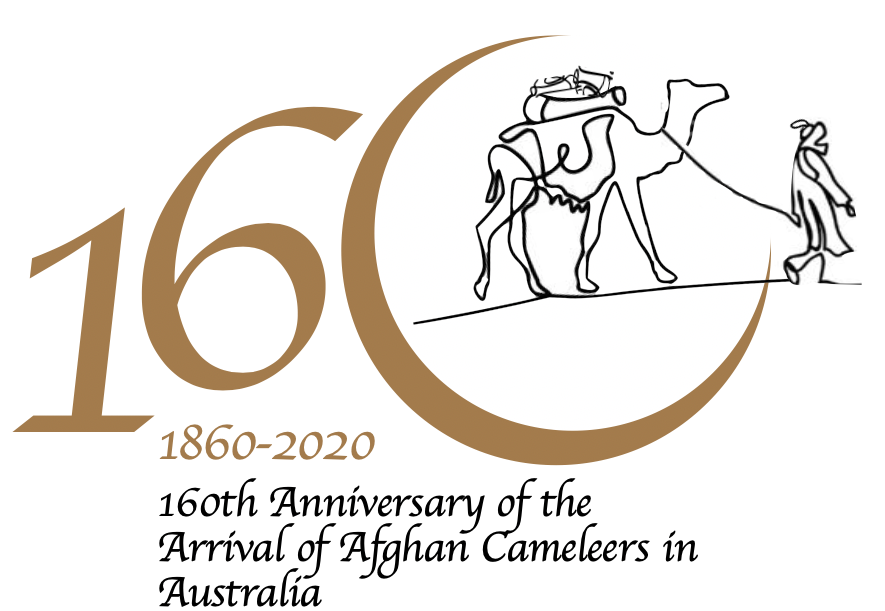
Recognising Aboriginal Afghans in Australia's National Reconciliation Week
Recognising Aboriginal Afghans - Australian National Reconciliation Week
Reconciliation Week is dedicated to strengthening relationships between Aboriginal and Torres Strait Islander peoples and non-Indigenous peoples, for the benefit of all Australians. Running from May 27th to June 3rdevery year, this week aims to draw attention to the ongoing journey towards a just, equitable and reconciled Australia where all people have access to the same opportunities and quality of life. Reconciliation Week is about celebrating Country and acknowledging our share histories, cultures and achievements; and this is reflected in this year’s theme - ‘In This Together’.
At the Embassy of Afghanistan, this means celebrating and raising awareness of the togetherness shared by Aboriginal communities and Afghans, who first arrived in Outback Australia as cameleers 160 years ago. These cameleers played a crucial role in developing inland Australia, and along the way settled and established rural Ghantowns. The long and deep connections forged by those Afghan cameleers who befriended and married into Indigenous communities and started families are today told by their descendants, and this Reconciliation Week the Embassy will be shining a light on these stories.
There are many proud descendants of Aboriginals Afghans living in Australia. As the National Reconcilian Week in Australia celebrating the relationship between Aboriginal and Torres Strait Islander peoples and non-Indigenous peoples for seven days only, we are gratful to introduce the follwoing seven desendants of Aboriginal Afghans who have lived and still living in Australia. Our viewers and audience in Afghanistan and Afghans all around the world are interested to read more about their lives, history and backgroud.
We thank Pamela Rajkowski, a research author specialising in the history, heritage and contribution of the Australian Afghan Cameleers (1860 - 1930), for her gnenerous contribution to this profile. Pamela has regularly collaborates with Afghan Cameleer descendants across Australia. The views and opinions expressed in this article are those of the authors and do not necessarily reflect the official policy or position of the Embassy of Islamic Republic of Afghanistan in Canberra or the Government of Afghanistan. Material presented throughout this article is for information purpose and is only as accurate as the sources allow.
Eric Sultan
Eric Sultan is a descendant of one of these early cameleers, and is also very proud of his Aboriginal heritage. His grandfather, Sultan Mohammed, arrived in Australia from Kandahar, Afghanistan in the late 1800s and worked on transporting goods all across the continent; from South Australia across to Western Australia, and north into the Northern Territory and Queensland. Eric is passionate about ensuring that the contributions of these cameleers and their descendants, particularly those Aboriginal Afghans, do not disappear from the history books.
Rocky Khan
Rameth Nameth “Rocky” Khan, son of Oodnadatta Afghan camel owner Nameth Allik Khan and Aboriginal mother Alison Stokes, with his sister Miriam and brother Akbar travelled across country and states on their father’s camel strings. From the 1910s Rocky and Akbar worked and lived between Marree and Beltana as labourers and station hands. His first and second marriages were to Aboriginal sisters Cissie then Esther Dodd of Marree. The 8 children of Rocky and Esther were given both Afghan and English names (only 7 in the photo). Rocky Khan regularly attended Afghan cameleer family reunions at the Marree camel races.
Janice Taverner (née Mahomet)
Peer Mahomet came East Afghanistan, to South Australia in the 1880s with his camels. He was contracted to cart sleepers for the Beltana and north railway line. In 1908 he married Ruby Rita Stuart, 16, a part-Aboriginal girl of Port Augusta. In 1900 Mullah Assam Khan of Marree became his brother-in-law when Ruby’s sister Agnes married the religious head. Peer and Ruby Rita lived and worked at mining at Muchatoona then raised their 6 children in Beltana. One son, John Mahomet, was the father of Janice Taverner (née Mahomet) of Beltana, who as a very proud descendant has been very active over decades in preserving her Afghan-Aboriginal and Afghan cameleer heritage. In 2007, Janice Taverner (née Mahomet) become member of a memorial committee, Voyagers. It is an artwork celebrates the ‘Afghan’ heritage of Adelaide. It commemorates cameleers who came to South Australia from Afghanistan. The form of the Yoyagers artwork alludes to the cultures of these men and their lives in Australia.
Larl Zada
Khan Zada, born in 1869, came from Afghanistan to work with camel strings in Bourke, then Broken Hill and Wilcannia. Khan Zada and his part-Aboriginal wife Mary Payne had ten children who were given both Afghan and English names. One son, Abdul “al” Zada, married an Afghan cameleer’s daughter Ayshi Dadleh, of Marree ghan town. Their two children, Larl Zada and Irene Zada, are Afghan Aboriginal descendants who live in Port Augusta and have actively supported events over decades to celebrate their heritage.
Nazmeena Mulladad (née Cummings)
Nazmeena Mulladad grew up in an Afghan cameleer family in Central Australia. According to an ABC radio feature (see the link below) her childhood was unique nomadic, traveling with the Muslim cameleers, at the beginning of the twentieth century. She had a harsh but exotic lifestyle that revolved around the work, the camels and Muslim worship. Her father, Sayid Mulladad, a camel owner of Oodnadatta Ghantown, married May Humphries, a part-Aboriginal woman of Hermannsburg mission. The Afghan father insisted their five children, all daughters, had Afghan female names [Vera “Wira”, Roseann, Bebe, Zulka Nanadulka and Nazmeena]. The parents took the five girls on camel carrying trips and when in Oodnadatta sent the girls to the Oodnadatta school. Sayid was delivering supplies to places beyond the train line. She was living and working with Aboriginal families, who were employed by the Afghan cameleers. Nazmeena's mother would assist at their births as the local white settlers would not assist the Aboriginal people with medical problems. Sayid Satour, of Farina then Alice Springs, a Pisheen born in Quorto, India, married an Aboriginal woman from Hermannsburg mission. Their one child, William John Satour, married Vera Mulladad, both Afghan Aboriginal descendants. Some descendants of the Alice Springs Mulladads - Satours continued to be practising Muslims.
Mona Wilson (née Akbar)
Mona Wilson (née Akbar) is a descendant of Jack Akbar who came to Australia some time in the late 19th century as an Afghan cameleer. He married Lallie an Aboriginal Wongai from Western Australia in South Australia. Mona Wilson and her family are of Afghan and Aboriginal heritage. Mona Wilson, nee Akbar, was born in Renmark, SA, on February 28th, 1930. Eldest of 4 to Jack and Lallie. Mona spent her childhood and young adulthood in Renmark, travelling to Adelaide each year to attend Mosque with her father. After his death she moved to WA to be near her mother's country. Due to WA policies of the time, her children were removed from her care and she and her partner relocated to Victoria where she remained until after his passing. The entire family were not reunited until the 1980s. Mona was involved with many community organisations in her later life and left a legacy of love, peace, reconciliation and education of self. Her favourite saying...You are never too old to learn something new! Mona Akbar passed away in 2016 when she was 86 years old. In the eulogy given at her funeral, a friend of Mona wrote: "The biggest thing I remember is her smile. Welcoming, bright, cheerful and encouraging. Positive and upbeat. It drew people in and once engaged her eloquent story-telling abilities usually kept them spellbound, sometimes for just a few minutes, other times for hours. She was generous with her knowledge, always happy to share what she knew". A community tribute Facebook page is developed by Mona's grandchildren and friends who are descendants of Aboriginal Afghan Cameleers. The page is called "a place to share stories, photos, videos and memories of Mona Wilson, nee Akbar".
Stay with us and follow #AboriginalAfghans160, #Inthistogether and #7AboriginalAfg7days
A Tribute to Afghan Cameleers by the Royal Australian Mint
Celebrating Australia’s pioneering Afghan Cameleers, the Royal Australian Mint has released two limited edition 50 cents coins (2500 each), in silver ($85) and Copper-Nickel ($10). The coin carries the new Jody Clark portrait of Queen Elizabeth II on the other side.
"With camels far more suited for transport and exploration than horses or bullocks, half the Australian population relied on Afghan cameleers for survival at one stage during the 19th century. An official issue of the Royal Australian Mint, this Silver Proof 50c coin forms a striking tribute to these Aussie pioneers", stated in the Royal Australian Mint website.
Not only eye-catching, the 2020 50c Afghan Cameleers Silver Proof Coin is also extremely exclusive. Only 2,500 coins have been struck! Beautifully presented within official packaging, each of those coins is housed within a Royal Australian Mint case, united with a numbered Certificate of Authenticity.
In 2019, the Royal Australian Mint has also released a coin for the 90th anniversary of the Ghan Train, a legacy of the Afghan Cameleers and their contribution to the Adelaide-Alice Spring railway construction.
The Embassy of the Islamic Republic of Afghanistan in Canberra thanks the Royal Australian Mint for these recognition and timely release of these exclusive coins.
Both Afghanistan and Australia have celebrated the 50th anniversary of their diplomatic relations (1969-2019).
For more details please visit: https://www.downies.com/2020-50c-afghan-cameleers-cuni-uncirculated-coin
Photo credit: The Royal Australian Mint


